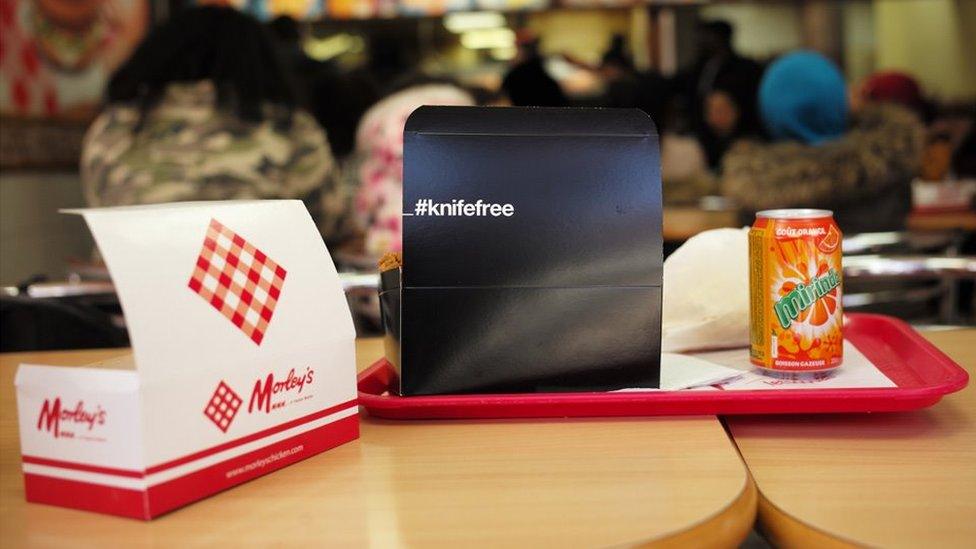Home Office emails reveal concern over 'racist' chicken shop scheme
- Published
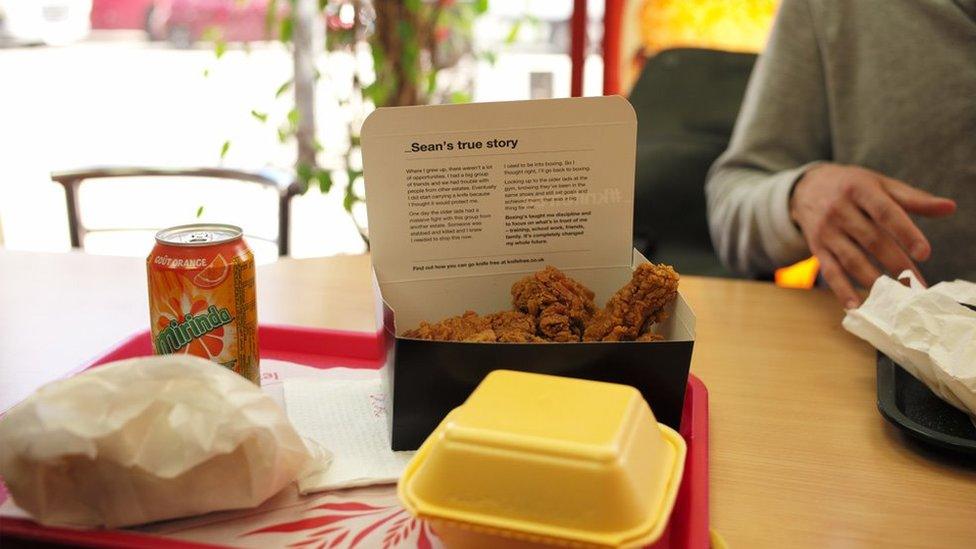
The boxes featured real life stories of young people who used to carry knives but had "turned their lives around"
Home Office staff worried the government had "publicised racist stereotypes" by running an anti-knife crime campaign in chicken shops.
Internal emails obtained by the BBC show staff thought media coverage revealed they were "out-of-touch" and risked "demonising" communities.
Despite concerns, the press team was asked to "bash the phones" for support.
Whitehall said the scheme was backed "by evidence" that gangs use food to lure children into drug-dealing.
In August 2019, more than 321,000 boxes featuring warnings about the dangers of carrying knives were sent to 210 takeaways across the UK.
It saw a huge public backlash, with critics saying the £58,000 campaign was "laced with racism".
As the Home Office press team monitored the outcry, one member of staff collated a tweet from the public which asked if "anti-cocaine messaging on sushi or Pret boxes" was next.

What was the campaign?
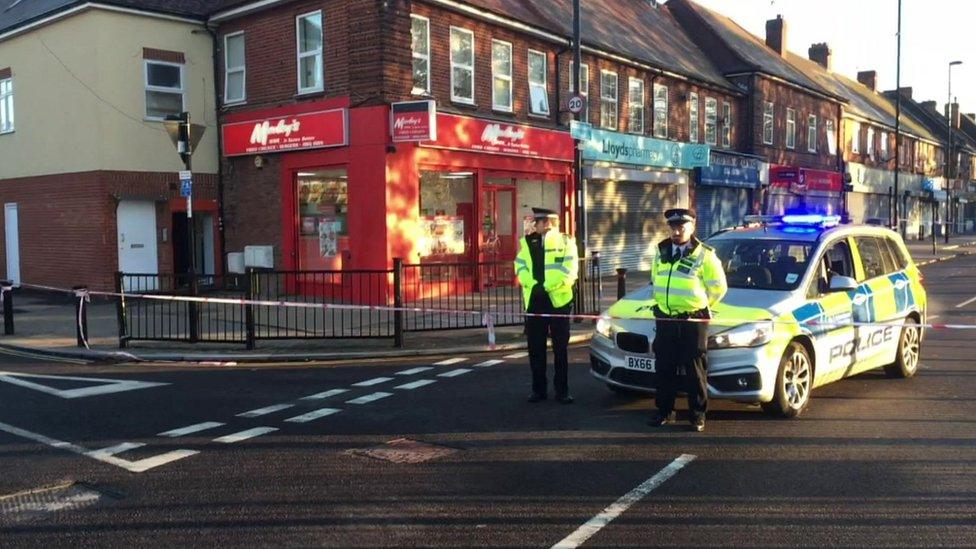
Jay Hughes was found with stab wounds at Morley's in Randlesdown Road on 1 November 2018
In April 2019, then Home Secretary Sajid Javid signed off a campaign for "real life stories" to be printed on chicken shop boxes.
The stories were about people who used to carry knives but had "turned their lives around".
The scheme was first piloted in 15 branches of Morley's across south London.
It was part of a response to a rise in serious youth violence and came in reaction to the murder of 15-year-old Jay Hughes, who was stabbed to death outside a Morley's in Bellingham in 2018.
The campaign was deemed a success and re-launched on 14 August 2019 in more chicken shops across the capital.

The initial public outcry was sparked by a Home Office tweet that attracted 250,000 engagements. Internal emails - obtained by the BBC under the Freedom of Information Act - noted the usual reach for Home Office tweets is around 1,000.
A separate emailed showed Priti Patel, who replaced Mr Javid as Home Secretary that summer, voiced "concerns" about the chicken box campaign and is quoted as saying she "didn't feel properly sighted on what was planned".
Allow X content?
This article contains content provided by X. We ask for your permission before anything is loaded, as they may be using cookies and other technologies. You may want to read X’s cookie policy, external and privacy policy, external before accepting. To view this content choose ‘accept and continue’.
The day after the tweet, the backlash was reported on news bulletins and daytime television.
Former Met Ch Supt Dal Babu told the Victoria Derbyshire programme the campaign targeted chicken shops because "the assumption is that is where black people go".
Mr Babu accused the Home Office of "racial elements" and questioned why fish and chip shops were not used.
YouTuber Elijah Quashie, known as the Chicken Connoisseur, said whoever came up with the idea needed to "be sent a P45".

YouTuber Elijah Quashie said the approach was too simplistic to solve a complex problem
Coverage continued on BBC News, Sky News and ITV's Loose Women, as well as in most of Britain's daily newspapers.
The press team emails show a bid from Good Morning Britain was refused because it would likely "see the story run for a second consecutive day".
A rebuttal in one email chain pointed to "positive feedback" following the earlier spring trial, which showed "67% of chicken shop customers are [aged] 16-24". But further emails questioned whether that percentage could actually be verified.
'Institutional racism'
Officials admitted they were "unsure what could be done publicly" to counter the mounting criticism.
One solution suggested was asking if Vice News would tweet in support of the Home Office's policy, with staff urged to "bash the phones" for any third-party support.
One member of staff said the focus on chicken shops had created a perception that the scheme "publicised racist stereotypes".
The official wrote: "This theme of institutional racism and an out-of-touch approach that demonises communities will potentially enrage many of the communities we are trying to build trust with."
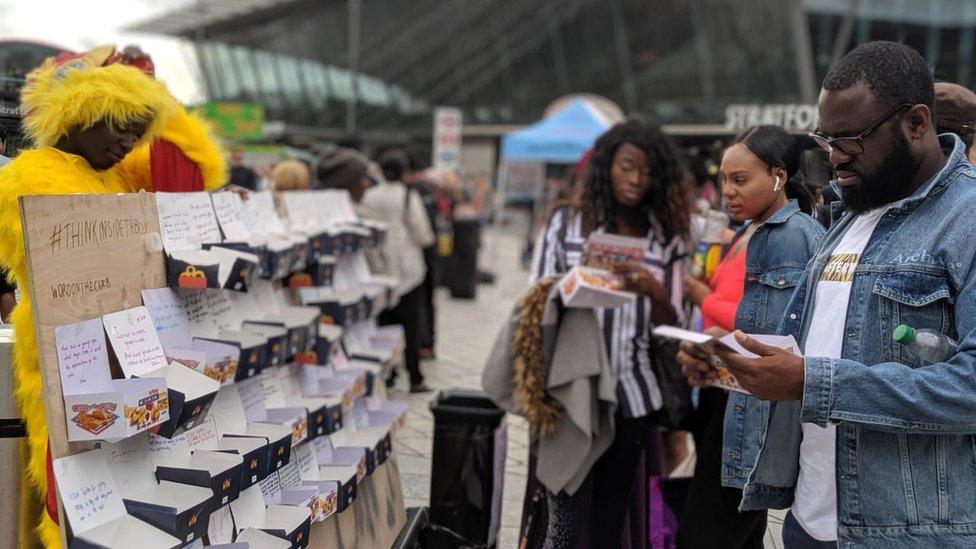
Chicken boxes filled with solutions from the public for tackling knife crime were taken to the Home Office
The Home Office said: "As long as young lives continue to be lost as a result of knife crime, we are willing to try whatever it takes to stop children being dragged into senseless violence.
"Our #KnifeFree campaign included advertising on social media and video on demand, to reach young people where they spend time.
"It also targeted a range of local outlets including fast food shops and community centres to move children away from a life of crime, which was supported by research."
Clarification 29 April 2021: This article has been amended to make clear that internal emails showed Home Office staff outlining social media and press reaction, rather than offering personal commentary.
Related topics
- Published19 August 2019
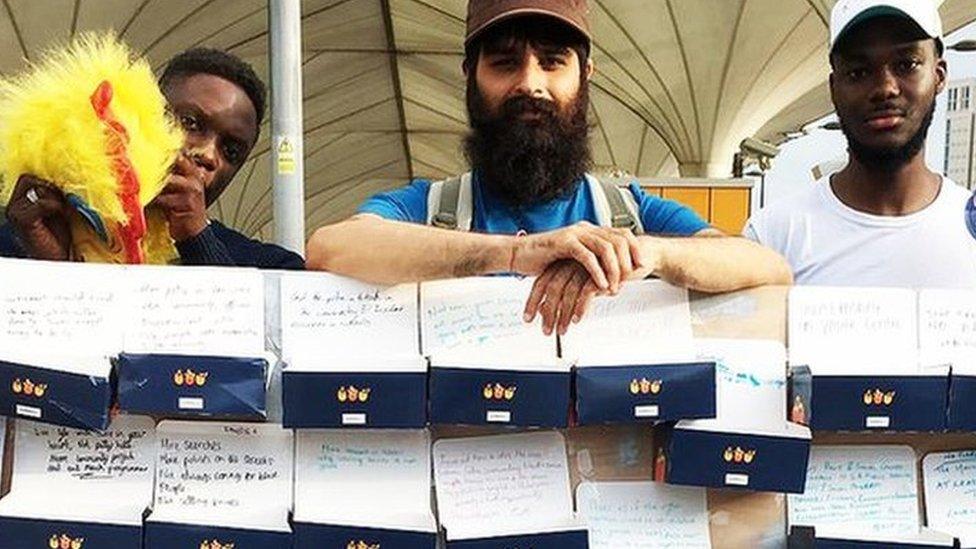
- Published20 August 2019

- Published15 August 2019
